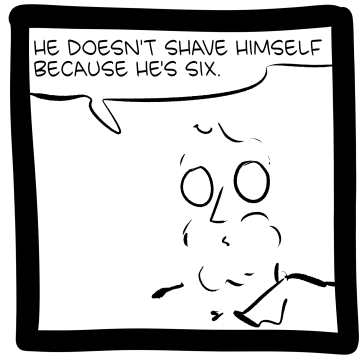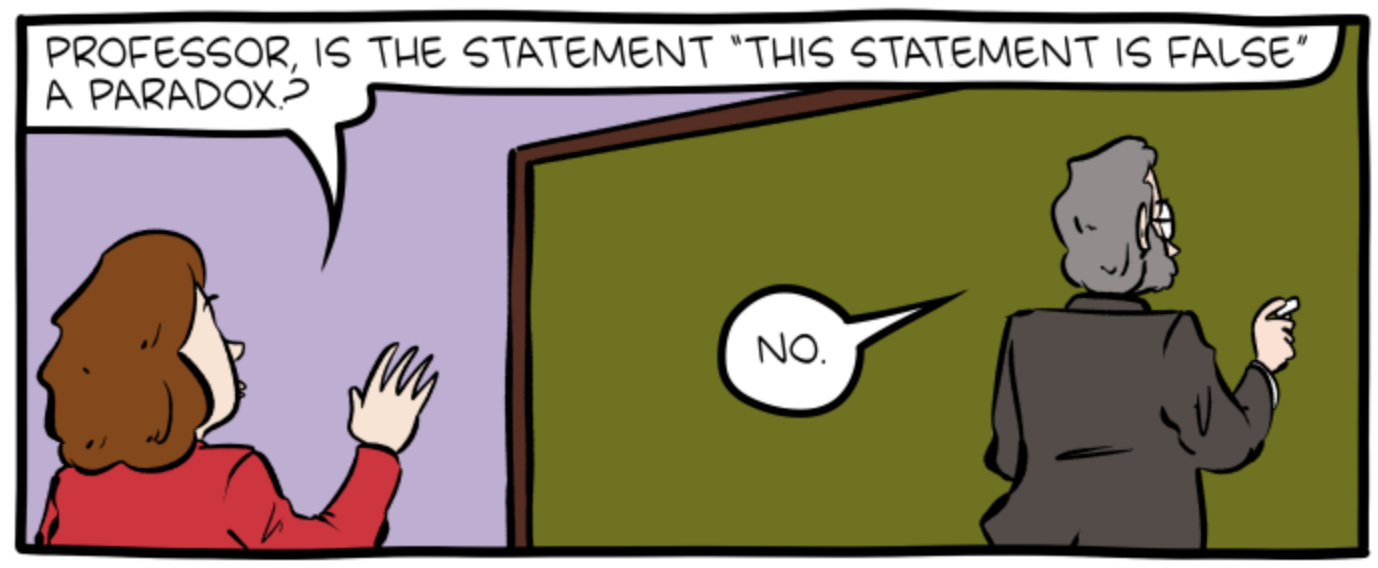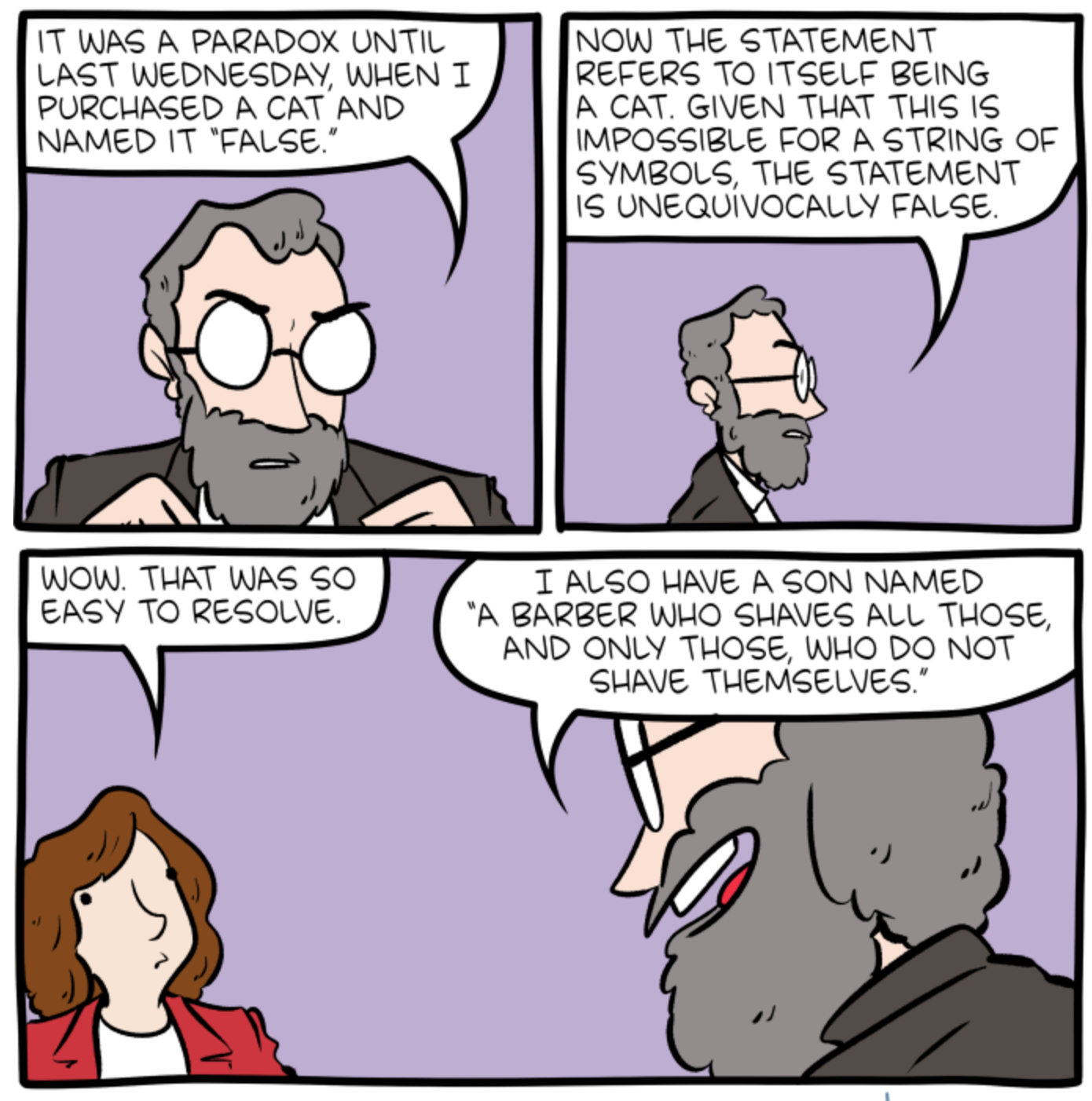A new way to resolve paradoxes
« previous post | next post »
Today's SMBC starts with this Q&A about (a version of) the Liar Paradox:
The solution:
The aftercomic:

The mouseover title: "You can resolve any paradox by just misunderstanding what the point was."


MattF said,
October 8, 2022 @ 2:12 pm
I’ve never understood the ‘barber’ paradox. There is, simply, no such barber.
Philip Taylor said,
October 8, 2022 @ 2:16 pm
I have always assumed that the barber was female, and that when Russell (or the paradox's author, if different) wrote of "all those who do not shave themselves", he was automatically restricting "all those" to males.
AntC said,
October 8, 2022 @ 3:59 pm
I’ve never understood the ‘barber’ paradox. There is, simply, no such barber.
Indeed. Russell preferred to call it an 'antinomy' rather than a 'paradox'.
But no, a female barber would be inconceivable in Russell's milieu.
Jonathan Badger said,
October 8, 2022 @ 10:29 pm
Russell's barber strikes me as an example of an analogy that adds too much irrelevant detail to be useful in explaining the problem. Yes, maybe the barber is female or hairless or is part of a religious group that doesn't shave. But the point was to explain "Russell's parodox" of sets and whether the set of sets that don't contain themselves can exist if it doesn't contain itself which it can't by definition. Bringing barbers into it just complicates things.
Gregory Kusnick said,
October 9, 2022 @ 12:03 am
We saw this paradox here a couple of years back in another guise, via the words "autological" and "heterological". A word is autological if it describes itself, heterological if it doesn't. "Autological" is clearly autological, but what about "heterological"?
AntC said,
October 9, 2022 @ 12:50 am
Bringing barbers into it just complicates things.
At the time set theory was novel amongst philosophers/logicians — let alone for the chattering classes. Sets and sets-of-sets and predicates on set membership/set comprehensions was all too abstract — let alone the distinction between sets vs 'classes'.
If you don't like the archaism (and dubious sexism) of barbers, take Accountants. Not just anyone can set up shop as an Accountant — unlicensed people providing accounting services are as likely to scalp you as a demon barber.
"A Chartered Accountant who files tax returns for all those, and only those, who do not file for themselves."
The (in effect) ban on Accountants filing their own return is to ensure unimpeachable rectitude in the accountancy trade: Accountants would know (if anybody does) how to wriggle past the regulations; getting a different Accountant to eyeball their return would provide independent oversight.
And the backstory (parallels the barber case): filing tax returns used to be onerous; so there was plenty of demand for Accountants/plenty of them; but with the coming of electronic filing, it become easier to file for yourself; to the point the demand for Accountants dwindled; until there was only one Accountant left in the town.
Applying that ban is unproblematic until there's only a single remaining Accountant. So a quantitative difference (number of Accountants) becomes a qualitative difference (impossibility of a sole Accountant).
Seth said,
October 9, 2022 @ 2:13 am
@ Philip Taylor – This is verging on the hoary fantasy cliche
Evil warrior: "My deal with the Dark One specifies no man can defeat me."
Good warrior: (removes disguise) "But I am a woman!"
@AntC – Russell's milieu may not have encompassed a female barber, but he was certainly aware of men who would not shave for religious reasons.
The implicit assumptions do say something about the culture, but trying to cover everything in the story itself results in some very tedious phrasing:
"A military unit in remote deployment consists entirely of members of sufficient age, biology, and health, so that they regular produce facial hair. Yet they are all required by regulation without exception to shave this facial hair. They elect to designate one member to be a specialist – "barber" – and per military cost regulations this specified to have the task of shaving *all* and *only* unit members who do not shave themselves. Who shaves the "barber"?
John Swindle said,
October 9, 2022 @ 7:16 am
With so much at stake, you an't afford to be too careful.
John Swindle said,
October 9, 2022 @ 7:17 am
… can't afford to be too careful. Slip of the finger. Sheesh.
stephen said,
October 9, 2022 @ 8:11 pm
The schedule is not specified; different people may prefer to be shaven once a week, once a month, once a year, once every 10 years or 20 years, and if the person dies before the 20 years is up, then the barber is off the hook
And what constitutes shaving— the barber might only shave part of the face, or the barber may pluck the hairs on their own face. As for the barber being a woman—a woman going through menopause might start growing facial hair. The barber can be a child or a eunuch, or the barber shaved them self, and pays a small fine as a penalty.
JPL said,
October 10, 2022 @ 12:41 am
"Any man who does not shave themselves is shaved by the barber; for any man who shaves himself, the barber does not shave him." separates the barber (agent) from the relevant sets (patients), because the negative description (of the event, as opposed to the participants) in this formulation is not reflexive, thus blocking the paradox. Same practical situation, different formulation of the rule (which, BTW, now specifies an open- ended "set", thus a possible category). This is a practical solution in the domain of natural language, where there is a practical difference between "the barber" and any other kind of man; but now what about Russell's Paradox? Different ways of describing the single logical situation may make a difference in explaining the paradox.
KeithB said,
October 10, 2022 @ 7:47 am
Seth:
Was Tolkien the first? I don't recall this trope in "classic" legends.
Of course, Tolkien really covered his bases by having 1. A woman; 2. An hobbit; 3. A magic blade from Westernesse.
pft said,
October 10, 2022 @ 12:48 pm
The point of "This sentence is false" is that there are grammatically sound sentences which cannot be assigned a truth value. The point of the Barber paradox is that it is _easy_ to do this: people really do say things like this all the time.
These people (that is, us) are not stupid. The claim about the barber, for example, is intended to convey true information; because of the way normal humans use natural language, it does.
Logicians and philosophers are not nit-picking trolls. The reason we are fascinated by these "paradoxes" is that they raise interesting questions about _how_ language works.
pfb said,
October 10, 2022 @ 12:49 pm
Oops, mis-typed. Pfb here.
Andreas Johansson said,
October 11, 2022 @ 1:34 am
@KeithB:
I dunno if Tolkien was first with the "a woman" solution, but he was deliberately trying to improve on Shakespeare, where Macbeth couldn't be killed by any man of woman born. He's killed by Macduff, who was born by caesarean section, which Tolkien thought was weak.
GH said,
October 11, 2022 @ 2:00 am
@Andreas Johansson, KeithB, Seth:
TV Tropes has a (somewhat more general) article on the trope, and within the immense list of the examples we find the Hindu myth of Mahishasura, who cannot be defeated by man or god and is unstoppable until confronted by the goddess Durga.
LW said,
October 11, 2022 @ 2:30 pm
i agree with the point that people trying to parse* the barber analogy are rather missing the point. but i'm also surprised that no one has mentioned the apparently related question, "can God create a rock so heavy that even he cannot lift it?". that one seems to be a perennial favourite among amateur philosophers / Internet atheists.
* i am trying out of a new sense of "parse" meaning "examine in detail", which i think has been previously covered on Language Log. i thought this was a bit odd the first time i saw it, but it's actually quite useful.
Michael Watts said,
October 12, 2022 @ 5:48 pm
I've never really gotten that one. It doesn't work as a Shakespeare reference for two reasons; first, Shakespeare never refers to a "man" that way, instead using the phrases "none of woman born" and "one of woman born". Second, of course, the loophole came from the fact that Macduff was not born of a woman, rather than the non-fact that Macduff wasn't a man.
But then if you go back and posit the spurious quote "no man of woman born", it still doesn't work because "man" is used in its original sense of "person" there.
Does this originate with Tolkien? He would have been well aware of what "man" meant at the time he was notionally writing about.
Michael Watts said,
October 12, 2022 @ 5:51 pm
(And of course in other contexts Tolkien contrasts Men with Elves, Dwarves, and Hobbits, which makes the explicit statement that Éowyn is a man.)
Seth said,
October 13, 2022 @ 7:28 am
@Michael Watts
I meant along the lines of the plot twist: "To resolve this (paradox|magic spell), the (barber|warrior) story character which you have implicitly assumed to be a man due to social roles, is really a woman!"
Indeed, this isn't Macbeth, where the language element there turns on "born" rather than "man" vs "women" (is there anywhere Macbeth can complain "You didn't restrict it to "born vaginally", a caesarean section still counts as "born""?). But it's in many others. It was notable in genre stories a while back, as a cultural reflection about gender roles.
GH gave a link with a list of this man/woman twist.
I feel like there's a Terry Pratchett type scene somewhere in here, i.e.:
Apparition: "Be bloody, bold, and resolute; laugh to scorn the power of man, for none of woman born shall harm [thee]!"
Warrior: "Now hold on a minute, I appreciate any protection, even if it obviously won't work against perils like infection or drowning. But can you clarify some of that? Does "none" connect to "man" or stand alone? Are wild animals included? Does "harm" extend to mental state? Again, I don't mean to be an ingrate, but surely you can tell me exactly what's the deal".
Kenny Easwaran said,
October 13, 2022 @ 10:33 am
I believe that in Hindu mythology there is also the story of Narasimha – the gods had made a deal with someone that he would not be attacked by man or animal, by day or night, etc., and eventually they need to attack him, so Vishnu comes in the form of Narasimha ("man-lion") at dusk, and otherwise in the supposedly excluded middle of each of the pairs.
Philip Anderson said,
October 13, 2022 @ 2:13 pm
@Kenny Easwaran
That’s a common motif in mythology and folktales, including the death of Lleu Llaw Gyffes in the Mabinogion (neither on foot or on horseback, in a house or outdoors, naked or clothed).